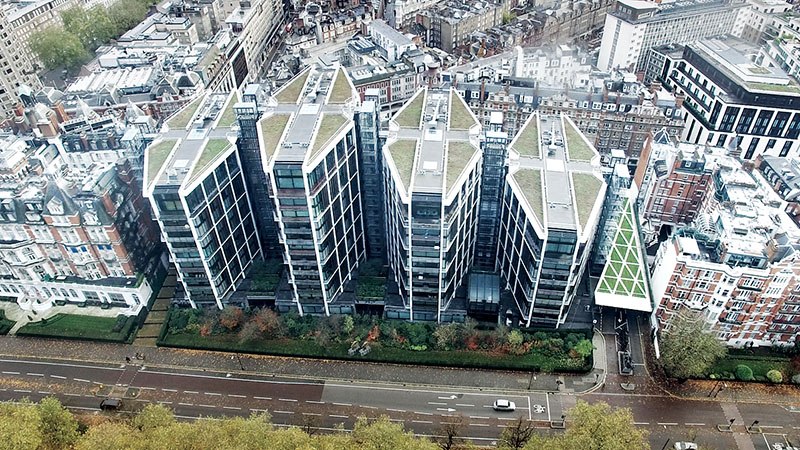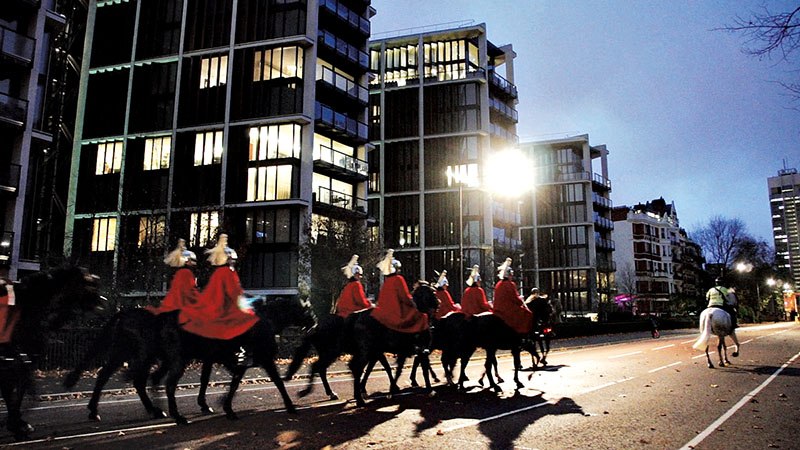Editor's Note: This report was produced by the investigative unit of Radio Free Europe/Radio Liberty's Ukrainian service with the support of SCOOP, a network for investigative journalists in Eastern Europe, Russia, Caucasus, Central Asia and West Africa, and the Objective investigative reporting project. The Ukrainian video version of this report is at radiosvoboda.org. The prices were converted from British pounds to U.S. dollars at today's exchange rates, not from the time of purchases.
LONDON – Knightsbridge, Kensington and Chelsea are the most desired
destinations for ultra-rich homebuyers from around the world, and
Ukraine’s oligarchs are no exceptions. House prices here are anything
north of $2.2 million.
The influx of foreign cash – often of dubious origin – this year has
forced the British government to consider tightening property-buying
regulations and banning shell companies from offshore havens that hide
real owners.
Ukraine’s richest man, Rinat Akhmetov bought the most
expensive apartment in London in 2011, at One Hyde Park for roughly $200
million. According to a range of reports in the British media,
Akhmetov’s London abode is a fortress, complete with bulletproof windows
and a panic room where he and his family can retreat should an
emergency arise.
The residential complex is guarded by former
marines, and they don’t welcome visitors. On a recent day in November, a
journalist from Radio Free Europe/Radio Liberty visited the residence,
and was stopped by a guard.
“Unfortunately, I cannot give you any
information about anything. Moreover, I have to ask you to leave the
premises. Unfortunately,” the guard said.
From the windows of his
apartment, Akhmetov can enjoy the nightly march of the Royal Guard of
Honor. And should he ever grow lonely, there are at least a couple of
oligarchs available nearby to drop by for a cup of tea.
For example,
it seems that fellow countryman and chemicals tycoon Dmytro Firtash
considers Britain as his second home because he bought a lot of property
there over the past few years, including an old subway station.

Ukraine’s richest billionaire Rinat Akhmetov bought a luxury apartment in One Hyde Park, the most prestigious residential complex in London. Many of the world’s wealthiest people invest in London real estate, prompting the British government changes rules that allow anonymous purchases through offshore companies. (Borys Trotsenko)
Firtash
has even featured in a parliamentary hearing last year because he has
paid money to high-ranking British politicians. His press service
declined requests for comment for this report.
“Mr. Firtash is
estimated to be worth between $600 million and $5 billion. He has been
linked to (Ukrainian) President (Viktor) Yanukovych and even to
President (Vladimir) Putin. I was therefore extremely concerned to
receive emails from human rights activists in Ukraine who claimed that
British parliamentarians had received money from Dmytro Firtash, a major
Ukrainian oligarch,” Helen Goodman, a member of parliament, said during
the March 2014 parliamentary hearing.
“I still think that there are
questions to be answered about whether the money which was given by Mr.
Firtash and his friends was buying access and… was buying influence,”
Goodman told RFE/RL.
Oliver Bullough, a British journalist and author
who specializes in corruption issues in the former Soviet Union,
discovered earlier this year that Firtash splashed out on a range of
properties in London. Bullough was flipping through a phone book and
stumbled upon the name of Firtasha’s Russian-born wife, Lada, listed as
the owner of a flat in Knightsbridge, close to Harrods, the luxury
shopping mall.
Bullough assumed that the flat was for personnel
located close to a bigger property – and he found it. It was a new
property worth roughly $90 million, developed by luxury real estate
dealer Michael Spink.
According to the real estate register,
Firtash’s house has five stories, two of which are underground. It has a
swimming pool, a gym, a conference room and at least four bedrooms. The
deal was completed in December 2012.
Just days after the EuroMaidan
Revolution, Firtash made another colossal acquisition on Feb. 27, 2014.
He bought the building of a former metro station, Brompton Road, which
has been out of use since 1934.

Royal Guard of Honor rides past One Hyde Park, the most prestigious residential complex in London. Ukraine’s richest man Rinat Akhmetov bought a luxury apartment here for a record-breaking sum of 136.4 million pounds in 2011. (Borys Trotsenko)
During World War II, Britain’s
Defense Ministry bought the property for $33,000, and it served as a
bomb shelter for a short while. In 2013, the ministry decided to sell
it, and Firtash bought it just before being arrested in Vienna in March
2014 at the request of the FBI, which suspected him of bribery.
Consequently, Firtash spent about a year under house arrest until an
Austrian court decided that the U.S. Justice Department failed to
provide enough evidence for his extradition to America.
Emma Grubb, a
spokeswoman for the UK’s Ministry of Defense, said in a statement: “206
Brompton Road was sold on the open market through appointed agents to
the highest bidder. Appropriate checks were carried out by the marketing
agents and the buyer was represented by a reputable UK law firm. We are
not able to give details of unsuccessful bidders or their offers. The
sale of the property conformed to strict guidelines set out by the
Treasury.”
Firtash paid roughly $80 million.
“It’s all about not
necessarily buying property and living here,” explains British
journalist and author Mark Hollingsworth, who wrote about foreign
tycoons in his book Londongrad. “It’s more about parking their money.
They want to move their money out of Russia or Ukraine or Kazakhstan or
wherever and put it in a safe place.”
This sort of investment has driven up prices in some neighborhoods.
Wesley
Davis, a financier and member of the board of directors at Asia-Pacific
Investment Partnership, used to live in Ennismore Gardens in South-West
London. He said the place was family-oriented for a long time, but then
the families got priced out.
“We started seeing a lot of
high-net-worth individuals from overseas moving into the area, buying
flats, buying multiple flats and joining them together… They were buying
them as their second and third, fourth, fifth residences. So, they are
not really living in the area,” he says, pointing out empty parking
spaces around, which is very unusual for London.
Just a short
distance away from Davis’ former residence, in Wycombe Square, sits a
pretty residential complex of 19 homes. Ukrainian political consultant
Vladimir Granovsky is the owner of house No. 4. In his comments through
Facebook messenger, he said he lives in Germany, not England, and
continues to do political consultancy.Another Ukrainian who has a
London address is Olga Kaletnyk. Her official home is located just a
couple of blocks away from Akhmetov’s – at 199 Knightsbridge Apartments,
but is owned by an offshore company in the British Virgin Islands. The
Kaletnyks are a prominent political family in Ukraine. Olga is the
sister of the former Communist Party parliament member Oksana Kaletnyk,
and the cousin of Igor Kaletnyk, who headed customs during Yanukovych’s
presidency. Olga is also the niece of another former lawmaker, former
Party of Regions member Hryhoriy Kaletnyk.
Officially Olga Kaletnyk designs clothes under the Ellion label. Her company refused to comment about the luxury property.
Hollingsworth
says that Russian and Ukrainian oligarchs like to buy property in areas
like Belgravia, Knightsbridge and Kensington for two reasons.
“One
is that they can show off to their friends and families – look I’ve got a
big house in Knightsbridge or in One Hyde Park. And then, secondly,
because it’s a good investment,” Hollingsworth says. “When Russian and
Ukrainian billionaires come to London, they have a very romanticized
view of London, they like sort of old-fashioned places. They will go to
very old-fashioned restaurants, dress up very English clothes.”
In
his book, Hollingsworth wrote a lot about Victor Pinchuk, a pipes and
media tycoon who also owns a luxury home in London. Located at 17 Upper
Phillimore Gardens, Kensington, it’s an area of luxury villas. Pinchuk
spent roughly $120 million on a four-story Victorian villa in 2008. At
the time, it was the equivalent of Hr 1 billion.
The house is
officially owned by an offshore company which walls off the real
beneficiary owner, but Pinchuk’s EastOne holding stated that the
property is theirs.
“The purchase of this real estate in London was
an investment under the mandate of investment and consulting company
EastOne, founded by Victor Pinchuk. The purchase was declared in 2008.
We would also like to draw your attention to the fact that on Jan. 30,
2008, shortly before the real estate deal in London, EastOne announced
the conclusion of a deal to sell 94.2 percent of shares of UkrSotsbank,”
Pinchuk’s holding said in a statement.
Hollingsworth said that the
money spent on property is frequently technically clean, but earned
“because of connections and manipulations.” Pinchuk is the son-in-law of
former President Leonid Kuchma and acquired valuable assets during his
presidency.
Meanwhile, a campaign has been under way in London
against the ghost owners of luxury apartments since Britain’s
independent Channel 4 broadcast a documentary in July called “From
Russia with Cash.” In the documentary, two undercover journalists –
including Natalie Sedletska from RFE/RL – talked to real estate agents
pretending to be a corrupt Russian official and his lover.
They said they wanted to buy a luxury home in London with cash stolen from the Russian budget. All of the agents agreed to help.
The
documentary added fuel to a campaign against foreign money parking in
London. “There is no place for dirty money in Britain,” said British
Prime Minister David Cameron in the wake of the broadcast.
Rachel
Davies, a senior advocacy manager at Transparency International UK,
said: “We don’t want any foreign company to be able to complete a
purchase of the UK property without having told the authorities who they
really are. Before buying a property they actually have to say who the
real beneficial owner really is. And of course some of them will lie –
but at least then they will be breaking the rules.”



